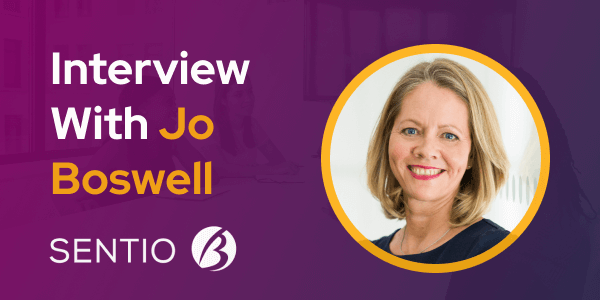Hi Jo, tell us about yourself and share some background about Sentio-B (And its founding story)
I started Sentio-B in 2018 after a 27-year career with British Airways where I held a number of senior leadership roles in the Customer Experience and Commercial functions, culminating in Head of Customer Value Management. At BA I was the driving force behind the ‘Know Me’ program, an initiative that embedded personalization into the airline’s customer experience and service strategy.
My aim in setting up Sentio-B was to help customer experience leaders translate CX strategies into meaningful business results in large, complex B2C companies; and I do this through a combination of coaching, mentoring, and consulting.
I combine big-picture thinking with a pragmatic approach, keeping a relentless focus on how to drive successful customer outcomes, balanced with business needs.
Online commerce was booming in 2020; how did it affect the shopper’s customer experience? – What should be the main focus for brands this year?
We’ve witnessed a huge surge in digital uptake over the last year. Whilst some of this has been from customers who are already digitally-savvy and are using the channel for a broader range of purchases, some of the uptakes has been from customers who were previously more reluctant to use these channels. According to data from IBM’s U.S. Retail index published last summer, the pandemic has accelerated the shift away from physical stores to digital shopping by roughly five years.
Much of this shift is probably here to stay, and brands will need to concentrate on getting the following things right in order to succeed:
- Create a seamless experience for customers across physical and digital interactions to allow customers to move effortlessly from one channel to another. We’ve been talking about this for years, and yet so many brands are still unable to join up the experience for their customers in this way.
- Innovate new customer journeys and propositions that blend physical and digital. It’s been interesting to see how some brands have adapted over the last year, for example, some UK fashion retailers are now working with Harper concierge service who describes themselves as ‘the luxury last mile’. Consumers go online to order the clothes they want to try on at home, and a style concierge delivers them; waits while they try them on; and even offers styling tips. The unwanted items are then returned, and the customer is only charged for what they keep.
- Use data intelligently to tailor services and conversations with customers across all of their interactions, and in particular to demonstrate empathy for the customer’s current context. Many organizations are sitting on untapped sources of customer data that could be used to inform and enhance their customer interactions.
The fundamentals of what makes a great customer experience haven’t changed: it needs to pain-free, proactive, personalized, and productive (saving you time); however, the context has changed. Customers are increasingly impatient with brands that don’t deliver on this, and companies now need to move at pace to keep up with ever-increasing customer expectations.
The evolution of the CX industry
How much has the customer experience industry evolved in the last 2-3 years with the arrival of automation, UGC data, and data-driven insights?
I think a lot of lip service is paid to the subject of customer experience without the practical steps to back it up. Kantar published a worrying stat at the end of last year: 91% of CEOs believe customer centricity is essential to driving business growth, yet only 19% of UK customers rate their brands as truly customer-centric.
There have been some really exciting developments over the last 10 years around AI, automation, and data-driven insights and I think the pace of change will continue to accelerate. If organizations really want to harness these to improve the experience, they need to focus as much on driving the cultural change internally as well, and this is an element that I often see overlooked.
Tell us about CX’s role in a pandemic crisis – what role digital transformation has in this crisis?
In such a rapidly changing environment, CX’s role needs to (continue to) be the customer champion, ensuring that the organization is adapting swiftly to changing customer needs and context. As businesses continue to adjust their delivery models, the CX team needs to ensure that these changes help their customers achieve successful outcomes.
Organizations need to use data and technology in smart ways to help customers achieve their goals. It frustrates me when I see it being deployed in ways to suit the organization’s purpose, rather than to help the customer. I once had a distressing experience with Microsoft when they forced me into their webchat channel to get assistance with a technical problem; the process was frustratingly slow and eventually, the person managing the webchat admitted to me that they were serving several customers at once!
What makes Sentio-B different from your direct competitors? And how is it different than legacy players in your space?
I work with customer experience leaders in large, complex, B2C organizations to help them translate their customer experience strategy into reality, delivering meaningful business results. I focus on the leadership skills they need to successfully influence the board, exec team, and the wider organization; and I bring the benefit of my practical experience of having successfully delivered this kind of transformation in the large, complex, multi-channel operational environment of an airline.
Whilst there is an ever-growing number of CX consultants in the market, there are still relatively few who have had the hands-on experience of delivering change at the scale I achieved with the ‘Know Me’ program at British Airways.
Do you think working from home is good or bad for employee experience? How do you think office strategy should be in Post covid19 days?
I think that the pandemic has opened our eyes to alternative ways of working that previously were considered ineffective. There are lots of positives to be drawn, but we must also recognize the downsides. My hope for the future is that there will be much greater flexibility and support for working from home, and companies will enable it as part of a progressive employee experience.






